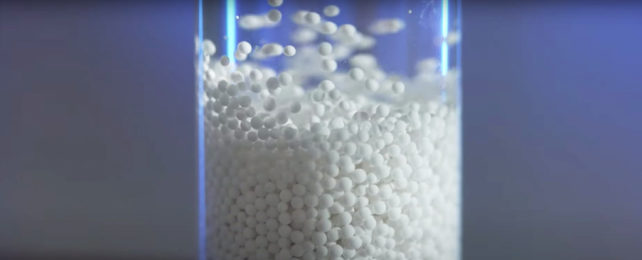Scientists have managed to stop advanced-stage cancers in mice through the use of implanted "drug factories" – and the new type of treatment only takes a few days to become effective.
While it will take some time to get this approach tested and working in humans, the signs are promising that we have a new and powerful way to tackle mesothelioma, an aggressive form of lung cancer.
The drug factories are made up of tiny beads made of alginate, each just 1.5-millimeters wide, and designed to produce continuous blasts of interleukin-2 (IL-2). This natural compound activates the body's white blood cells to fight tumors.
"I take care of patients who have malignant pleural mesothelioma," says thoracic surgeon and surgical oncologist Bryan Burt from the Baylor College of Medicine. "This is a very aggressive malignancy of the lining of the lungs, and it's very hard to treat completely by surgical resection."
"In other words, there is often residual disease that is left behind. The treatment of this residual disease with local immunotherapy – the local delivery of relatively high doses of immunotherapy to that pleural space – is a very attractive way to treat this disease."
That "pleural space" refers to the layer of tissue covering the lungs, which is also where mesothelioma tumors develop. Part of the success of the treatment is down to the way that it's locally targeted.
The team also combined the implants with what's known as a checkpoint inhibitor, a type of drug that doesn't tackle cancer directly but trains the immune system to better identify and eliminate cancer cells. Here an inhibitor targeting the PD-1 protein was used.
On their own, the drug factory implants wiped out the tumors in more than half of the animals tested. When combined with the checkpoint inhibitor on seven mice, the tumors were completely destroyed.
"What our data show is that delivery of these immunotherapy particles, regionally, to these mice who have mesothelioma, has very provocative and very effective treatment responses," says Burt.
"In fact, I've not seen these mesothelioma tumors in mice be eradicated, with such efficacy, as we have in this mouse model."
From the results that the scientists got, they're confident that there's a good chance that the treatment could also effectively train the memory T cells in the body to fight mesothelioma again, should it reoccur.
While IL-2 treatments have been shown to be effective, they can also come with some pretty serious side effects. This is another area where the targeted nature of the new therapy can help because it limits the parts of the body that are exposed to the drug.
What's more, the same drug bead factory technique has previously been used by some of the same researchers to try and tackle ovarian cancer, and human clinical trials for that treatment are scheduled to start in the next few months. It's a treatment that has the potential to go way beyond mesothelioma.
"From the beginning, our objective was to develop a platform therapy that can be used for multiple different types of immune system disorders or different types of cancers," says bioengineer Amanda Nash from Rice University in Texas.
The research has been published in Clinical Cancer Research.
